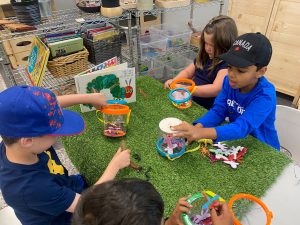It may be obvious that children need to eat healthily to effectively grow and develop, however, there are aspects of healthy eating that are less obvious and can be important for parents to consider. In childcare centres like The Green Elephant, there is a major focus on ensuring healthy eating habits are instilled at a very early age so that children carry on the habit as they transition through adolescence and into adulthood. These habits can also have a very large impact on the short-term development of the child, with their diet having influence over their physical and emotional health. The most important aspects of healthy eating in children are outlined below.
What Types of Foods Are Actually Healthy For Children To Eat?
It is essential for children to consume the correct nutrients to assist all areas of their growth. Some essential nutrients that are essential for this development are calcium and vitamin 2 for bone development and immunity, iron for cognitive development and omega-3 DHA to support brain function. Childcare centres aim to optimise these nutrients in meals they prepare for children and will often produce meals for children that include foods such as fruit and vegetables, whole grain rice, bread, pasta or grains; beans and lentils, lean meat, fish, eggs, nuts and seeds.
What Types of Foods Are Unhealthy For Children To Eat?
Some foods are inessential in a child’s diet. These foods are known as discretionary foods and are foods that are high in added sugars or salt, kilojoules and saturated fat. These foods can be eaten by children in small amounts but should be limited as they can lead to children becoming overweight or developing conditions as they get older. These types of foods include sugary drinks, sweet biscuits, cakes or desserts, processed meats and fried foods. Childcare centres often provide alternatives using vegetable oils and spreads, nut butters or avocado and avoiding refined and processed foods by making them from scratch.
What Are Signs of A Poor Diet In Children?
Some telltale signs to look for when trying to identify a potentially poor diet include the following; Children appearing underweight, overweight or obese can indicate overeating. Signs such as being pale in appearance or acting lethargic can show that children are not receiving the correct nutrients required to function normally. Other factors such as tooth decay, behavioural problems, sleep issues and problems with emotional and psychological development can highlight that children are not consuming a balanced diet that is causing their mood to fluctuate and cause physical and emotional issues. Research has provided evidence that eating habits established in early childhood have an impact on children’s food preferences and patterns in adulthood. This highlights the importance of establishing healthy eating habits early in a child’s life.
What Are The Ways To Encourage Children To Eat Healthy Food?
Childcare centres encourage children to eat healthier food by using a variety of approaches. Strategies such as using colours to make a plate of food look appealing and fun to the child or making a picture using different shapes of food have been found to appeal to children. Getting creative will encourage the child to experiment with different flavours and textures. Increasing a child’s control in the decision-making processes related to food can also increase their interest in eating certain types of foods. By serving a variety of healthy foods including healthy snacks and cooked meals, children can have a balanced diet and expand to eating a variety of different foods.
What Can You Do At Home To Encourage Healthy Eating Habits?
At The Green Elephant, we do our best to promote the healthiest diets and habits for children as we can, however, to have lasting effects this also must be mirrored at home. There are many approaches you can take to encourage these healthy patterns. By providing a variety of healthy foods and limiting the unhealthier options, children will be more inclined to like healthier alternatives. It is also advisable not to reward good behaviour or to stop bad behaviour with food such as sweets or unhealthy food, with parents finding other solutions as a reaction to behaviour. These should not be eliminated completely or put into good or bad categories. Avoid pressuring children to finish plates of food when full as this can lead to habits of overeating and not following internal hunger cues. Children also learn eating habits through observation, so your family eating habits should be reflective of how you want your child to eat. This also applies to conversations around eating. For example, constant dieting or discussion of negative body image can be reflective on your child and affect their perception of food.
Establishing healthy eating habits in children during their time in childcare centres and at home, paves the way for them to develop skills in identifying a healthy balanced diet and positive eating patterns that will last throughout their future.





